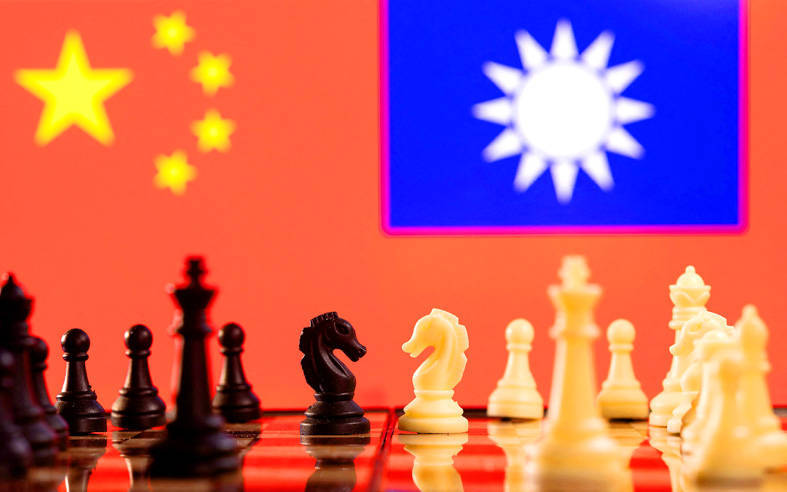《TAIPEI TIMES》 Beijing’s economic charm offensive failed: US media

Chess pieces are pictured in front of People’s Republic of China and Republic of China flags on Jan. 25 last year. Photo: Reuters
CHINA INFLUENCE: A ‘Wall Street Journal’ report said Beijing’s strategy to use economic ties to bring Taiwan closer to it has failed to achieve its goals
/ Staff writer
Beijing’s attempted economic charm offensive to woo Taiwanese is not working as more Taiwanese businesses are shifting to other countries and reducing the dependence on China, the Wall Street Journal (WSJ) reported on Thursday.
A sign of the shift was that the US replaced China as the top buyer of Taiwanese agricultural products for the first time last year, and electronics firms including Taiwan Semiconductor Manufacturing Co (TSMC) are also selling more goods to American and other non-Chinese buyers, the report said.
Citing Taiwan government data, the report said Taiwanese exports to the US in the first 10 months this year were more than 80 percent higher than in the same period of 2018.
Taiwan’s outbound investment has also shifted from mostly to China in the early 2000s to now decisively toward other destinations, including Southeast Asia, India and the US, it said.
Hon Hai Precision Industry Co, internationally known as Foxconn, a Taiwanese electronics giant that assembles iPhones in China, is expanding in India and Vietnam after Apple Inc began pushing its suppliers to diversify, but it was followed by tax and land-use probes, seen by some as Beijing trying to pressure Hon Hai into resisting decoupling with China, the report said
“Fully decoupling from mainland China’s economy likely isn’t possible, and would be disastrous for Taiwan,” the WSJ report said, adding that many major Taiwanese companies depend heavily on China for parts, testing and buyers, and that about 25 percent of Taiwan’s electronic parts imports still come from China.
However, many forces are pushing Taiwan to rewire its economic relations with China, including tariffs from the administration of former US president Donald Trump and export controls by the administration of his successor, US President Joe Biden, rising wages in China and long-running shifts in Taiwanese sentiment toward China (such as those triggered by China’s export bans on Taiwanese agricultural products), the report said.
Taiwan’s government is also encouraging closer economic links with Southeast Asia, South Asia, Australia and New Zealand, as it rolled out the New Southbound Policy in 2016, the report said, adding that consequently, exports to countries covered by the policy have risen to US$66 billion in the first nine months of this year, about 50 percent higher than the same period in 2016.
According to CEIC data, the US and the six largest Southeast Asian economies together accounted for 36 percent of Taiwanese exports in the third quarter of this year, surpassing the percentage sent to China and Hong Kong on a quarterly basis for the first time since 2002.
Citing Taiwanese government data, it said Taiwanese foreign investment into China, which had been steady at about US$10 billion a year for most of the early 2010s, plummeted in late 2018 and has since been running at about half that level, and so far this year, 13 percent of Taiwan’s investment went to China; 25 percent went to other Asian locations, and nearly half went to the US.
新聞來源:TAIPEI TIMES















